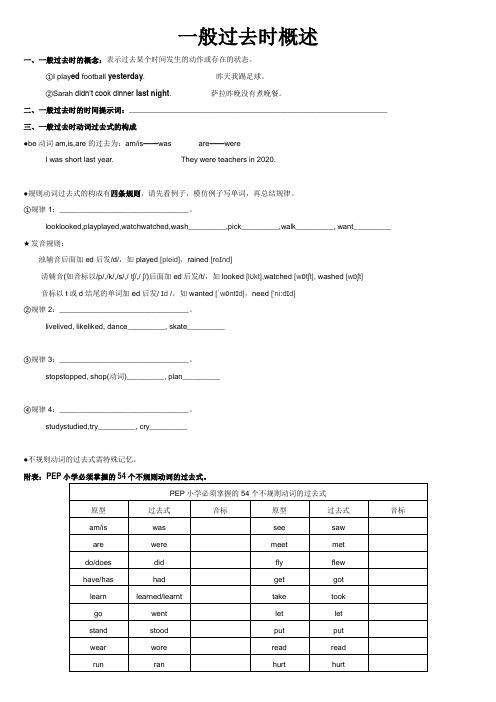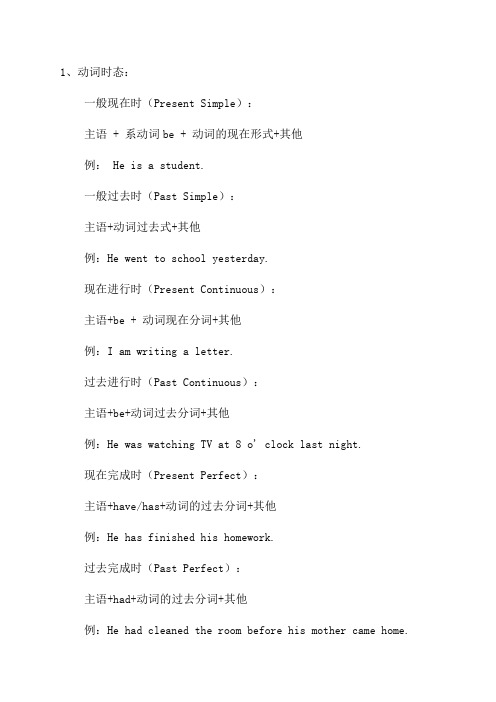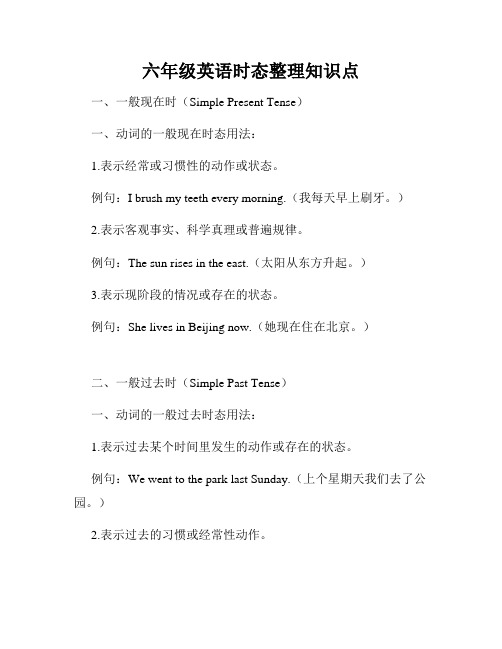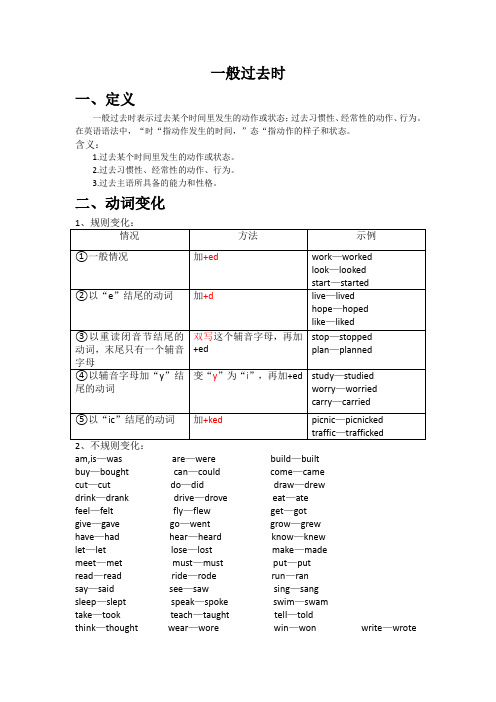六年级英语一般过去式
一般过去时 六年级英语知识点

一般过去时(小学)一、定义1.表示过去某个时间发生的动作或存在的状态。
如:She ate three apples yesterday. 昨天她吃了三个苹果。
I got up at 6:30 yesterday. 我昨天6:30起床。
My father was very busy last week.我父亲上周很忙。
2.表示过去经常或过去反复发生的动作(也可与often,always等频率副词连用)。
如:He always got up very early when he was young.年轻的时候,他每天总是起得很早。
二、谓语形式:动词的过去式(1)She was a student two years ago. 两年前她是一个学生。
(这件事情已经过去了,所以be动词is要用过去式was)(2)they were students two years ago. 两年前他们/她们是学生。
(这件事情已经过去了,所以be动词are要用过去式were)(3) Ann washed her clothes last night. 安昨晚洗了她的衣服。
(这件事情已经过去了,所以动词wash要用过去式washed)(4) I did my homework promptly. 我及时地完成了作业。
(这件事情已经过去了,所以动词do要用过去式did)三、句子结构:(a) be 动词的过去式句型: (b)动词过去式句型:(a) be 动词的过去式句型:1.肯定句:主语+be 动词(was , were)+其他,如:She was a student two years ago. 两年前她是一个学生。
2.否定句:主语+be not(was not, were not)+其他,如:She was not a student two years ago. 两年前她不是一个学生。
3.一般疑问句:Be动词(Was/Were)+主语+其他?肯定回答为“Yes,主语+was/were”,否定回答为“No,主语+wasn’t/weren’t”。
一般过去时(讲义)-人教PEP版英语六年级下册

一般过去时概述一、一般过去时的概念:表示过去某个时间发生的动作或存在的状态。
①I play ed football yesterday. 昨天我踢足球。
②Sarah didn’t cook dinner last night. 萨拉昨晚没有煮晚餐。
二、一般过去时的时间提示词:______________________________________________________________三、一般过去时动词过去式的构成●be动词am,is,are的过去为:am/is——was are——wereI was short last year. They were teachers in 2020.●规则动词过去式的构成有四条规则,请先看例子,模仿例子写单词,再总结规律。
①规律1:_______________________________。
looklooked,playplayed,watchwatched,wash_________,pick_________,walk_________, want_________ ★发音规则:浊辅音后面加ed后发/d/,如played [pleid],rained [reɪnd]清辅音(如音标以/p/,/k/,/s/,/ tʃ/,/ʃ/)后面加ed后发/t/,如looked [lʊkt],watched [wɒtʃt], washed [wɒʃt]音标以t或d结尾的单词加ed后发/ɪd /,如wanted [ˈwɒntɪd],need ['ni:dɪd]②规律2:_______________________________。
livelived, likeliked, dance_________, skate_________③规律3:_______________________________。
stopstopped, shop(动词)_________, plan_________④规律4:_______________________________。
外研社(三起)小学英语六年级下册一般过去时

Infinitive am / is are begin break bring build buy can
常见不规则动词
Past tense was were began broke brought built bought could
__D_i_d__ he __f_in_d_ ___a_n_y_ meat in the fridge?
3. She stayed there for a week.(对画线部分提问)
__H_o_w__ __lo_n_g__ __d_id__ she _s_t_ay__ there?Leabharlann That’s great!
1. Xiao Lin went fishing this morning.(改为一般疑问句) 2. We visited our teacher last night.(就画线部分提问) 3. He had lunch at school.(改为否定句) 4. There was some milk in the bottle. (就画线部分提问) 5. He went to that city with his uncle. (改为一般疑问句)
行为动词的一般过去式: a. 规则动词的变化规则: (1)一般动词直接加-ed (2)以e结尾的动词直接加-d (3)以辅音字母加y结尾的词,变y为i再加-ed (4)以重读闭音节结尾,词尾只有一个辅音字母,双写辅音字母加-ed
注:规则动词过去式的发音: 在清辅音后读/t/,在元音和浊辅音后读/d/,在辅音/t/,/d/后读 /id/。 b. 不规则动词变化需参看不规则动词表逐一熟记。
Exercise
按要求完成下列句子。
1. Lucy did her homework at home.(改为否定句)
一般过去时 六年级英语知识点

一般过去时六年级英语知识点一般过去时是表示过去某个时间发生的动作或存在的状态的时态。
例如,昨天她吃了三个苹果,我昨天6:30起床,我父亲上周很忙。
它也可以表示过去经常或过去反复发生的动作,常与often、always等频率副词连用。
例如,年轻的时候,他每天总是起得很早。
谓语形式是动词的过去式。
例如,两年前她是一个学生,这件事情已经过去了,所以be动词is要用过去式was。
另外,两年前他们/她们是学生,安昨晚洗了她的衣服,我及时地完成了作业,这些动词都要用过去式。
句子结构包括be动词的过去式句型和动词过去式句型。
在be动词的过去式句型中,肯定句的结构是主语+be动词(was,were)+其他,例如,两年前她是一个学生。
否定句的结构是主语+be not(was not,were not)+其他,例如,两年前她不是一个学生。
一般疑问句的结构是Be动词(Was/Were)+主语+其他?例如,两年前她是一个学生吗?肯定回答为“Yes,主语+was/were”,否定回答为“No,主语+___”。
特殊疑问句的结构是特殊疑问词+一般疑问句(顺序)?例如,她两年前是什么职业?Where were you yesterday。
I was at home.In the past tense。
there are three types of sentences: affirmative。
negative。
___ the structure of subject + past tense verb + other words。
For example。
"___ the structure of subject + did not + base form of verb + other words。
For example。
"She did not eat three ___ the structure of did + subject + base form of verb + other words + n mark。
六年级英语知识点所有公式

1、动词时态:一般现在时(Present Simple):主语 + 系动词be + 动词的现在形式+其他例: He is a student.一般过去时(Past Simple):主语+动词过去式+其他例:He went to school yesterday.现在进行时(Present Continuous):主语+be + 动词现在分词+其他例:I am writing a letter.过去进行时(Past Continuous):主语+be+动词过去分词+其他例:He was watching TV at 8 o' clock last night.现在完成时(Present Perfect):主语+have/has+动词的过去分词+其他例:He has finished his homework.过去完成时(Past Perfect):主语+had+动词的过去分词+其他例:He had cleaned the room before his mother came home.将来完成时(Future Perfect):主语+will/shall+have+动词的过去分词+其他例:I will have finished my homework by 6 o'clock.2、句型:祈使句:肯定句:(1)Let +宾语+动词原形(2)Do it!否定句:(1)Don't do it.(2)Let's not do it.一般疑问句:(1)Do+主语+动词原形?(2)Shall we do it?特殊疑问句:(1)What shall we do?(2)How shall we do it?3、定语从句:(1)关系代词:who,which,that,whose,whom(2)关系副词:when,where,why(a)关系代词:who,which,that,whose,whom(b)关系副词:when,where,why(4)引导词:a)引导定语从句的连接词:that,which,who,whom,whoseb)引导定语从句的关系代词:who,which,that,whose,whom。
六年级英语一般过去时动词过去式必背知识点

小学六年级英语动词过去式必背知识点规则动词词尾加百度-ed有三种读音:1.在清辅音后读作[t]。
如:asked,helped,watched,stopped2.在浊辅音和元音后读作[d]。
如:enjoyed,studied,moved,called3.在t/d后读作[id]。
如:wanted,needed动词过去式变化形式:规则动词的过去式由“动词原形+-ed”构成,具体变化有:1.直接在词尾加-ed。
如:want—wanted,work—worked,need—needed,clean—cleaned2.以不发音的e结尾的在词尾加-d。
如:like—liked,live—lived,use—used,move—moved3.以一个元音字母加一个辅音字母结尾的重读闭音节动词,先双写结尾的辅音字母,再加-ed。
如:stop—stopped,trip—tripped4.以辅音字母加y结尾的动词,先把y变成i,再加-ed。
如:study—studied,carry—carried, hurry—hurried,marry—married不规则动词的过去式大体上归纳有以下六条记忆法:1.以t结尾的词,过去式与原形相同。
如:put—put,let—let,cut—cut,beat—beat2.以d结尾的词,把d变成t。
如:build—built,lend—lent,send—sent,spend—spent3.以n结尾的词,在词后加t。
如:mean—meant,burn—burnt,learn—learnt4.以ow/aw结尾的词,把ow/aw变成ew。
如:blow—blew,draw—drew,know —knew,grow—grew5.含有双写字母的词,将双写改为单写,在词尾加t。
如:keep—kept,sleep—slept,feel —felt,smell—smelt6.含有元音字母o/i的词,将o/i变成a。
六年级英语时态整理知识点

六年级英语时态整理知识点一、一般现在时(Simple Present Tense)一、动词的一般现在时态用法:1.表示经常或习惯性的动作或状态。
例句:I brush my teeth every morning.(我每天早上刷牙。
)2.表示客观事实、科学真理或普遍规律。
例句:The sun rises in the east.(太阳从东方升起。
)3.表示现阶段的情况或存在的状态。
例句:She lives in Beijing now.(她现在住在北京。
)二、一般过去时(Simple Past Tense)一、动词的一般过去时态用法:1.表示过去某个时间里发生的动作或存在的状态。
例句:We went to the park last Sunday.(上个星期天我们去了公园。
)2.表示过去的习惯或经常性动作。
例句:He always played football when he was young.(他年轻时总是踢足球。
)三、一般将来时(Simple Future Tense)一、动词的一般将来时态用法:1.表示将来某个时间内将要发生的动作或存在的状态。
例句:I will go to the beach next weekend.(下周末我会去海滩。
)2.表示将来的打算、意图或预测。
例句:She is going to be a doctor in the future.(她将来会成为一名医生。
)四、现在进行时(Present Continuous Tense)一、动词的现在进行时态用法:1.表示现在进行的动作。
例句:I am studying for the exam at the moment.(我正在复习考试。
)2.表示现阶段的变化、发展或趋势。
例句:The population of the city is increasing rapidly.(这个城市的人口正在迅速增长。
)五、过去进行时(Past Continuous Tense)一、动词的过去进行时态用法:1.表示过去某个时间里正在进行的动作。
(科普版)小学六年级英语一般过去时

一般过去时一、定义一般过去时表示过去某个时间里发生的动作或状态;过去习惯性、经常性的动作、行为。
在英语语法中,“时“指动作发生的时间,”态“指动作的样子和状态。
含义:1.过去某个时间里发生的动作或状态。
2.过去习惯性、经常性的动作、行为。
3.过去主语所具备的能力和性格。
二、动词变化am,is—was are—were build—builtbuy—bought can—could come—camecut—cut do—did draw—drewdrink—drank drive—drove eat—atefeel—felt fly—flew get—gotgive—gave go—went grow—grewhave—had hear—heard know—knewlet—let lose—lost make—mademeet—met must—must put—putread—read ride—rode run—ransay—said see—saw sing—sangsleep—slept speak—spoke swim—swamtake—took teach—taught tell—toldthink—thought wear—wore win—won write—wrote三、句法结构当句子中出现“yesterday,last night,in1997,two days ago”等单词时,则要注意动词是否需要变过去式。
1、肯定形式主语+动词过去式+其它例句:She often came to help us in those days.I did my homework yesterday evening.2、否定形式主语+didn't +谓语动词原形+其它①was/were+not;例句:I wasn’t at home yesterday.②在行为动词前加didn't,同时还原行为动词例句:I didn't know you like coffee.3、一般疑问句①Did+主语+谓语动词原形+其它?例句:Did I do homework?②Was/Were+主语+表语?例句:Were you late yesterday?4、特殊疑问句①疑问词+ did+主语+动词原形+其它?例句:What did you do last weekend?②疑问词+was/were+主语+其它?例句:Where was he yesterday?When were you born?记忆口诀:一般过去时并不难,过去动作、状态记心间。
- 1、下载文档前请自行甄别文档内容的完整性,平台不提供额外的编辑、内容补充、找答案等附加服务。
- 2、"仅部分预览"的文档,不可在线预览部分如存在完整性等问题,可反馈申请退款(可完整预览的文档不适用该条件!)。
- 3、如文档侵犯您的权益,请联系客服反馈,我们会尽快为您处理(人工客服工作时间:9:00-18:30)。
( ) 8. – Did you play football? ________ football. B. plays A. play (
) 9. __________you__________ to school last Sunday? A. Did, come B. Do, come C. Were, come
2、动词一般过去时变化规则 、
1.一般在动词末尾加-ed,如:cook-cooked, play- played
2.结尾是e加d,如:dance—danced live—lived love—loved use—used argue—argued like—liked phone—phoned arrive—arrived 3.末尾只有一个元音字母和一个辅音字母的重读闭音节,应双写末尾 的辅音字母,再加-ed,如:stop-stopped,drop—dropped,skip— skipped。control—controlled
(
) 6. He ______ his grandparents last Sunday. A. visit B. visited C. visits
(
) 7. Where did you go _______? A. tomorrow B. now
C. just now -- Yes. I C. played
★一般过去时★ 一般过去时★
1、概念 、
表示在过去某个时间里所发生的动作 或存在的状态。 或存在的状态。通常在句子里找到表 示过去时间的词或词组。 示过去时间的词或词组。如: yesterday,yesterday morning/ , evening,this morning,last morning, , night/week/ month/year,, ,,two days ,, ago,a week ago,等。 , , 如:I went to bed at eleven last night. 昨晚我11: 睡觉 昨晚我 :00睡觉
(
) 10. ______ he ______ football last weekend? A. Did, played B. Did, play C. Did, plays
(2)句中没有 动词的一般过去时的句子 句中没有be动词的一般过去时的句子 句中没有 动词的一般过去时的句子.
He goes to school.. 过去式:He went to school.
否定句:He didn’t go to school. 疑问句:Did 动词的一般过去时
is\ is\am
study
drop
are play ask read make come do watch eat does has sit
help put go have run
二、选择题
( ) 1. We ______ an English play a moment ago. A. see B. sees C. saw ( ) 2. Liming ________ last Sunday morning. A. cut hair B. cuts hair C. is cutting ( ) 3. He ________ the clothes yesterday. A. didn’t wash B. didn’t washed C. ’ ’ don’t washed ’ ( ) 4. It ______ a windy day yesterday. A. is B. was C. am ( ) 5. What ______ you usually(经常地) do on (经常地) the weekend? A. are B. do C. did
4.以“辅音字母+y”结尾的,变y为i,再加-ed,如:study-studied, carry—carried try—tried
句式变化
(1) Be动词在一般过去时中的变化。 动词在一般过去时中的变化。 动词在一般过去时中的变化
1) am 和is在一般过去时中变为was。(was not=wasn’t) ( ’) 2) are在一般过去时中变为were。(were not=weren’t) ( ’) 3) 带有was或were的句子,其否定、疑问的变化和is, am, are一样, 即否定句在was或were后加not,一般疑问句把was或were调到句 首。
